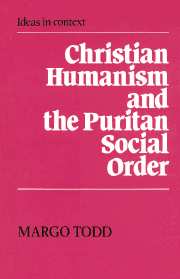Book contents
- Frontmatter
- Contents
- preface
- Abbreviations
- 1 Introduction: The demythologizing of puritanism
- 2 Christian humanism as social ideology
- 3 The transmission of Christian humanist ideas
- 4 The spiritualized household
- 5 Work, wealth and welfare
- 6 Conscience and the Great Chain of Being
- 7 The conservative reaction: Trent, Lambeth and the demise of the humanist consensus
- Bibliography
- Index
7 - The conservative reaction: Trent, Lambeth and the demise of the humanist consensus
Published online by Cambridge University Press: 06 July 2010
- Frontmatter
- Contents
- preface
- Abbreviations
- 1 Introduction: The demythologizing of puritanism
- 2 Christian humanism as social ideology
- 3 The transmission of Christian humanist ideas
- 4 The spiritualized household
- 5 Work, wealth and welfare
- 6 Conscience and the Great Chain of Being
- 7 The conservative reaction: Trent, Lambeth and the demise of the humanist consensus
- Bibliography
- Index
Summary
Erasmus encountered opposition from conservative Catholic theologians as soon as the core documents of his social criticism had become available. The University of Paris waged unremitting warfare on the Colloquies and the Moriae Encomium in particular; the theologians of Louvain attacked among other works the Encomium Matrimonii in 1519; 1527 saw a conference of theologians at Valladolid condemning Erasmian ‘heresies’; and in 1533 a vigilant group of theologians raided a Paris bookshop and confiscated Erasmus’ Colloquies, the Moriae Encomium, the Encomium Matrimonii, the annotated translation of the New Testament, and even (surely by mistake) the De Copia verborum. The heaviest fire was consistently drawn by those works most critical of ecclesiastical authority and most insistent on the availability of the Scriptures to the laity. And the attacks increased dramatically in frequency and virulence after the appearance of Luther on the scene. The hierarchy clearly perceived Erasmus’ works as a threat to clerical privilege and authority, to the church's monopoly on learning and interpretation, and ultimately to the unity and order of Christendom.
With the earliest opposition to Erasmus, the Catholic Reformation can be seen transforming itself into the Counter-Reformation. The fear of a critical and potentially disobedient laity drew from the threatened hierarchy a reaction against innovation, against lay initiative, against any new developments which could detract from the authority vested in the clerical estate.
- Type
- Chapter
- Information
- Christian Humanism and the Puritan Social Order , pp. 206 - 260Publisher: Cambridge University PressPrint publication year: 1988

